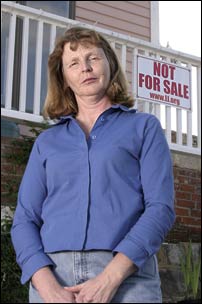
Our Klamath Basin Water Crisis
Upholding rural Americans' rights to grow food,
own property, and caretake our wildlife and natural resources.

Our Klamath Basin
Water Crisis
Upholding rural Americans' rights to grow food,
own property, and caretake our wildlife and natural resources.
Institute for Justice: Property Rights Cases: New London, CTHomeowners Lose Eminent Domain CaseInstitute for Justice Warns: Supreme Court Leaves Homeowners Vulnerable To Tax-Hungry Bureaucrats & Land-Hungry DevelopersWEB RELEASE: June 23, 2005
Washington, D.C.— Today, the U.S. Supreme Court delivered a blow to home and small business owners throughout the country by allowing the government to use eminent domain to take homes so that businesses can make more money off that land and possibly pay more taxes as a result. The Institute and its clients issued the following statements after learning of today’s decision. Chip Mellor, the president of the Institute for Justice, said, “The majority and the dissent both recognized that the action now turns to state supreme courts where the public use battle will be fought out under state constitutions. The Institute for Justice will be there every step of the way with homeowners and small businesses to protect what is rightfully theirs. Today’s decision in no way binds those courts.” “The Court simply got the law wrong today, and our Constitution and country will suffer as a result,” said Scott Bullock, senior attorney for the Institute for Justice. “With today’s ruling, the poor and middle class will be most vulnerable to eminent domain abuse by government and its corporate allies. The 5-4 split and the nearly equal division among state supreme courts shows just how divided the courts really are. This will not be the last word.” “One of the key quotes from the Court to keep in mind today was written by Justice O’Connor,” Bullock said. “Justice O’Connor wrote, ‘Any property may now be taken for the benefit of another private party, but the fallout from this decision will not be random. The beneficiaries are likely to be those citizens with disproportionate influence and power in the political process, including large corporations and development firms.’” Dana Berliner, another senior attorney with the Institute for Justice, said, “It’s a dark day for American homeowners. While most constitutional decisions affect a small number of people, this decision undermines the rights of every American, except the most politically connected. Every home, small business, or church would produce more taxes as a shopping center or office building. And according to the Court, that’s a good enough reason for eminent domain.”
Mellor said, “Today’s decision doesn’t end the Institute for Justice’s fight against abuses of eminent domain. We will work to ensure not only that the property owners in New London keep their homes, but that all home and small business owners are protected from these unconstitutional land grabs by governments and their business allies. This is a terrible precedent that must be overturned by this Court, just as bad state supreme court eminent domain decisions in Michigan and Illinois were later overturned by those courts.” Susette Kelo, one of the homeowners challenging eminent domain abuse, said, “I was in this battle to save my home and, in the process, protect the rights of working class homeowners throughout the country. I am very disappointed that the Court sided with powerful government and business interests, but I will continue to fight to save my home and to preserve the Constitution.” Mike Cristofaro, another one of the homeowners whose family has owned property in Fort Trumbull for more than 30 years, said, “I am astonished that the Court would permit the government to throw out my family from their home so that private developers can make more money. Although the Court ruled against us, I am very proud of the fight we waged for my family and for the rights of all Americans.” New London, ConnecticutKelo v. New London
|
| .Kelo Case Central | |
|
U.S. Supreme Court Argument was February
22, 2005
Download: the U.S. Supreme Court
opinion of Kelo v. New London
Download: transcript of the U.S.
Supreme Court argument of Kelo v. New
London Reporters and Editors: Download op-eds for publication Download photos from U.S.S.C. oral argument Thanks to those who came out to support property rights in your town. Come back for the latest on Kelo v. New London: Bookmark this page |
|
 |
|
| Susette Kelo received notice of condemnation from the NLDC (New London Development Corporation) the day before Thanksgiving 2000. |
Susette Kelo dreamed of owning a home that
looked out over the water. She purchased and
lovingly restored her little pink house where the
Thames River meets the Long Island Sound in 1997,
and has enjoyed the great view from its windows
ever since. The Dery family, down the street from
Susette, has lived in Fort Trumbull since 1895;
Matt Dery and his family live next door to his
mother and father, whose parents purchased their
house when William McKinley was president. The
richness and vibrancy of this neighborhood
reflects the American ideal of community and the
dream of homeownership.
Tragically, the City of New London is turning that
dream into a nightmare.
In 1998, pharmaceutical giant Pfizer built a plant
next to Fort Trumbull and the City determined that
someone else could make better use of the land
than the Fort Trumbull residents. The City handed
over its power of eminent domain—the ability to
take private property for public use—to the New
London Development Corporation (NLDC), a private
body, to take the entire neighborhood for private
development. As the Fort Trumbull neighbors found
out, when private entities wield government’s
awesome power of eminent domain and can justify
taking property with the nebulous claim of
“economic development,” all homeowners are in
trouble.
Home
Page Updated: Thursday May 07, 2009 09:15 AM Pacific
Copyright © klamathbasincrisis.org, 2005, All Rights Reserved